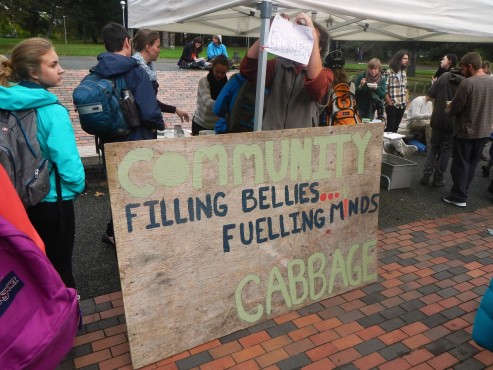The University of Victoria Sustainability Project (UVSP) recently established an alternative UVic club called The Community Cabbage. The Cabbage aims to reduce food waste and provide education about the flaws in Canada’s food system. The group received a $500 grant from the UVSP on Nov. 6, which they intend to spend on cooking supplies.
The mandate of the club is to create connections with grocery stores so edible food is donated to the Community Cabbage, rather than being thrown out.
Last semester, the Cabbage began serving free food to an average of 100 students outside the MacLaurin Building most Fridays at lunch. Initially the club dumpster dived, a task they call “rescuing food,” in order to prove the presence of food waste in Victoria.
“There’s a flaw in the system we are trying to address, so if we follow all the rules then we’re kind of defeating our purpose,” said Kelsey Monsen, a club member.
The group’s 15 members would clean, prepare, and cook sorted food in their homes before bringing the meals to campus. The club plans to prepare donated food in a similar fashion until a relationship with an on-campus kitchen is established. The Cabbage continues to serve vegan meals and inform people eating the food where the ingredients come from.
The club formed during UVic’s sixth Environmental Roundtable meeting on the basis of reducing food waste. The Cabbage was inspired by other Canadian universities with similar successful clubs. UBC’s Sprouts program provides an example for the group.
Mother Nature’s Market and Deli, an organic grocery store on Cook St. with a focus on natural and local products, has shown interest in the project.
“We have high standards,” said store manager Hugette Barbot. “We are an all-natural store; therefore, anything that is bruised or not perfect looking, people simply won’t buy it, so it’s therefore wasteful. It’s the kind of food that is still absolutely suitable to be consumed but cannot be sold”.
According to Monsen, 40 per cent of food produced in Canada is discarded due to physical appearance, over-stocking, and flexible expiration dates.
Barbot predicts small issues with the exchange until the “work in progress” settles, but she doesn’t expect any major issues. “Being able to give [healthy] food to students who maybe could have a hard time to afford it makes total sense to me,” she said.
Monsen had the opportunity to interview a Community Cabbage founder, John Bransfield. In the interview, Bransfield states: “Canada seems to be much worse than many other countries when it comes to wasting food,” he said, detailing the process by which food is shipped to stores, and from stores to consumers. “Food has a high chance of going bad or being destroyed before reaching your table.”
Students can receive updates on serving times and locations by “liking” The Community Cabbage on Facebook. Aspiring volunteers can also join the club’s Facebook page.







